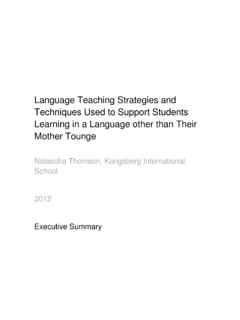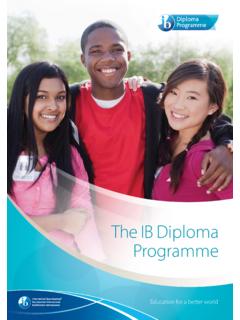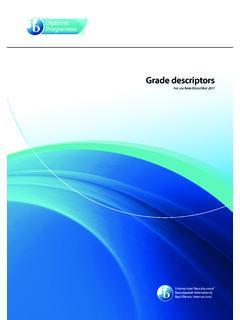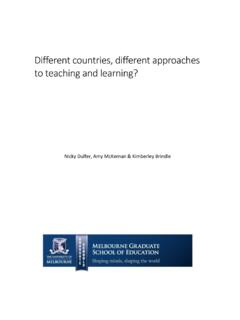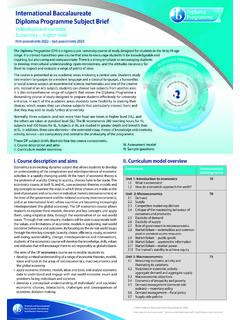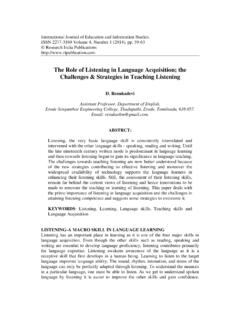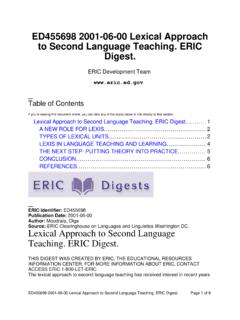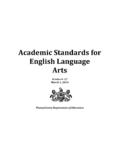Transcription of International Baccalaureate Diploma Programme Subject Brief
1 International Baccalaureate Diploma Programme Subject Brief language BFirst assessment 2020 International Baccalaureate Organization 2018 International Baccalaureate | Baccalaur at International | Bachillerato Internacional I. Course description and aimsLanguage acquisition consists of two modern language courses language ab initio and language B designed to provide students with the necessary skills and intercultural understanding to enable them to communicate successfully in an environment where the language studied is B is a language acquisition course designed for students with some previous experience of the target language . Students further develop their ability to communicate through the study of language , themes and texts.
2 There are five prescribed themes: identities, experiences, human ingenuity, social organization and sharing the language B SL and HL students learn to communicate in the target language in familiar and unfamiliar contexts. The distinction between language B SL and HL can be seen in the level of competency the student is expected to develop in receptive, productive and interactive HL the study of two literary works originally written in the target language is required and students are expected to extend the range and complexity of the language they use and understand in order to communicate. Students continue to develop their knowledge of vocabulary and grammar, as well as their conceptual understanding of how language works, in order to construct, analyse and evaluate arguments on a variety of topics relating to course content and the target language culture(s).
3 The following language acquisition aims are common to both language ab initio and language B. Develop International -mindedness through the study of languages, cultures, and ideas and issues of global significance. Enable students to communicate in the language they have studied in a range of contexts and for a variety of purposes. Encourage, through the study of texts and through social interaction, an awareness and appreciation of a variety of perspectives of people from diverse cultures. Develop students understanding of the relationship between the languages and cultures with which they are familiar. Develop students awareness of the importance of language in relation to other areas of knowledge.
4 Provide students, through language learning and the process of inquiry, with opportunities for intellectual engagement and the development of critical- and creative-thinking Course description and aimsII. Curriculum model overviewIII. Assessment modelIV. Content outlineIB Diploma PROGRAMMEINTERNATIONAL MINDEDNESSMATHEMATICSAND LITERATUREINDIVIDUALS THEORY OF KNOWLEDGE EXTENDED ESSAY CREATIVITY, ACTIVITY, SERVICEAPPROACHES TO TEACHINGAPPROACHES TO LEARNINGSCIENCESSTUDIES IN LANGUAGEACQUISITIONTHE ARTSLANGUAGEAND SOCIETIESThe Diploma Programme (DP) is a rigorous pre-university course of study designed for students in the 16 to 19 age range.
5 It is a broad-based two-year course that aims to encourage students to be knowledgeable and inquiring, but also caring and compassionate. There is a strong emphasis on encouraging students to develop intercultural understanding, open-mindedness, and the attitudes necessary for them to respect and evaluate a range of points of course is presented as six academic areas enclosing a central core. Students study two modern languages (or a modern language and a classical language ), a humanities or social science Subject , an experimental science, mathematics and one of the creative arts. Instead of an arts Subject , students can choose two subjects from another area. It is this comprehensive range of subjects that makes the Diploma Programme a demanding course of study designed to prepare students effectively for university entrance.
6 In each of the academic areas students have flexibility in making their choices, which means they can choose subjects that particularly interest them and that they may wish to study further at , three subjects (and not more than four) are taken at higher level (HL), and the others are taken at standard level (SL). The IB recommends 240 teaching hours for HL subjects and 150 hours for SL. Subjects at HL are studied in greater depth and breadth than at addition, three core elements the extended essay, theory of knowledge and creativity, activity, service are compulsory and central to the philosophy of the IB DP Subject Brief has four key components: Provide students with a basis for further study, work and leisure through the use of an additional language .
7 Foster curiosity, creativity and a lifelong enjoyment of language Curriculum model overviewThe curriculum is organized around five prescribed themes with which the students engage though written, audio, visual and audio-visual develop into successful, effective communicators by considering the conceptual understandings of context, audience, purpose, meaning and is evidenced through receptive, productive and interactive Assessment modelThe language acquisition assessment objectives are common to both language ab initio and language B. Communicate clearly and effectively in a range of contexts and for a variety of purposes. Understand and use language appropriate to a range of interper-sonal and/or intercultural contexts and audiences.
8 Understand and use language to express and respond to a range of ideas with fluency and accuracy. Identify, organize and present ideas on a range of topics. Understand, analyse and reflect upon a range of written, audio, visual and audio-visual Content outlineThemeGuiding principleOptional recommended topicsPossible questionsIdentitiesExplore the nature of the self and what it is to be human. Lifestyles Health and well-being Beliefs and values Subcultures language and identity What constitutes an identity? How do language and culture contribute to form our identity?ExperiencesExplore and tell the stories of the events, experiences and journeys that shape our lives.
9 Leisure activities Holidays and travel Life stories Rites of passage Customs and traditions Migration How does our past shape our present and our future? How and why do different cultures mark important moments in life?Human ingenuityExplore the ways in which human creativity and innovation affect our world. Entertainment Artistic expressions Communication and media Technology Scientific innovation What can we learn about a culture through its artistic expression? How do the media change the way we relate to each other?Social organizationExplore the ways in which groups of people organize themselves, or are organized, through common systems or interests. Social relationships Community Social engagement Education The working world Law and order What is the individual s role in the community?
10 What role do rules and regulations play in the formation of a society?Sharing the planetExplore the challenges and opportunities faced by individuals and communities in the modern world. The environment Human rights Peace and conflict Equality Globalization Ethics Urban and rural environment What environmental and social issues present challenges to the world, and how can these challenges be overcome? What challenges and benefits does globalization bring?About the IB: For 50 years, the IB has built a reputation for high-quality, challenging programmes of education that develop internationally minded young people who are well prepared for the challenges of life in the 21st century and are able to contribute to creating a better, more peaceful further information on the IB Diploma Programme , visit: Subject guides can be accessed through the Programme resource centre or purchased through the IB store: For more on how the DP prepares students for success at university, visit.
